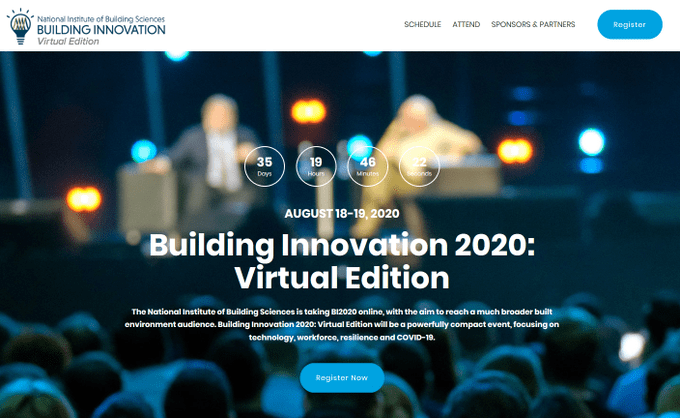Building Innovation 2020 Resilience Sessions to Cover Zero Energy, Housing Affordability

WASHINGTON, DC – Resilience is a national issue. Natural disasters like wildfires and floods are only increasing in frequency and volume, costing the U.S. an average of $100 billion annually. This is part of the reason building resilience will be prominently featured during Building Innovation 2020: Virtual Edition.
The annual meeting of the National Institute of Building Sciences takes place August 18-19.
“Building resilience is critical,” says Lakisha A. Woods, CAE, President and CEO of NIBS. “From COVID-19 to climate change-related disasters increasing in frequency and regularity, the built environment must be safe, sustainable and resilient. Our communities and cities must be able to handle extreme circumstances.”
The resilience keynote will be delivered by Billie Faircloth, Partner with KieranTimberlake. In How We See Now, Faircloth will discuss resilience through the daily actions and diverse projects of KieranTimberlake.
Other BI2020 resilience sessions include:
- Zero Energy on a Shoe-String Budget with Marc Clinch, Chief Facilities Officer with the School District of Osceola County in Florida, and Philip Donovan, AIA, Project Architect on NeoCity Academy, and Principal, Little Diversified Architectural Consulting. This presentation will cover lessons learned on a case study of Florida’s first zero-energy school.
- Convergence of Design and Resilience in a Hospital for the Future + Minimally Invasive Laboratories with Judy Ou, Associate Principal, Perkins Eastman Architects, Robin Whitehurst, Technical Principal, Bailey Edward Design, Inc., and Carlos L. Amato, Principal, CannonDesign. The design of the new Stanford Hospital in Palo Alto, California, sets new standards reflecting state-of-the-art resiliency elements. These elements include cutting-edge architecture, a 40,000 SF rooftop garden, and LEED Silver-equivalent sustainability features.
- How to Pay for Mitigation with Kayed I. Lakhia, Director, Hazard Mitigation FEMA/DHS, Sean Kevelighan, President & CEO, Insurance Information Institute, Michael Hernandez, Vice President Housing Access, Affordable Housing Initiatives, Fannie Mae, and Carl Hedde, Principal of CGH Consulting, LLC and Chair, NIBS. The discussion panel will focus on how to pay for the mitigation activities through a public/private partnership. Natural disaster losses in three of the last 15 years have exceeded $100 billion, and it’s getting costlier.
- Housing Affordability and Resilience with Ryan Colker, Vice President, Innovation with the International Code Council, Laurie Schoeman, Senior National Program Director, Resilience and Disaster Recovery, Enterprise Community Partners, Inc., and Christopher Bourne, Deputy Assistant Secretary for Innovation, U.S. Department of Housing and Urban Development. This session will examine the importance of including resilience in strategies to address housing affordability and the role of building codes in supporting resilience for low income households.
Building Innovation is a premiere event and brings together architects, engineers, code officials, manufacturers, innovators, public and private sector representatives, officials from building and construction, and local, state and government leaders. It will cover topics like technology, building performance, design, mitigation, green jobs, workforce development, and the challenges that COVID-19 brings to the built environment.
The event presenting sponsor is the International Code Council.
About NIBS
National Institute of Building Sciences brings together labor and consumer interests, government representatives, regulatory agencies, and members of the building industry to identify and resolve problems and potential problems around the construction of housing and commercial buildings. NIBS is a nonprofit, non-governmental organization. It was established by Congress in 1974. For more information, visit nibs.org or follow @bldgsciences on Twitter and Facebook


